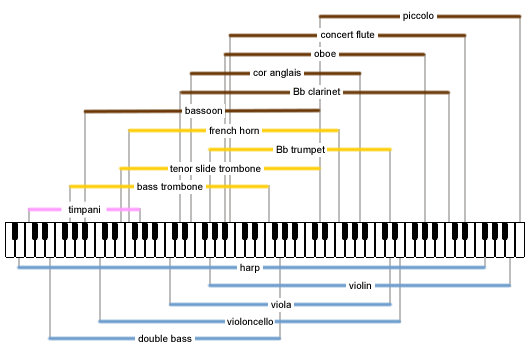I
n
composing a theme on the keyboard, a composer may overlook certain characteristics of
a piece that disclose the nature of the instrument it was intended for or composed,
leaving a passage transparently unnatural to the ear.
If a
song, (tune), supposedly composed for flute does not, for example, allow for the physical
need of the performer to actually breath... or if the duration of a
note should obviously overlap the next note, it would sound quite
unnatural. A flutist cannot play two notes at the same time. A theme
composed with chords is more likely to have been done using a piano
voice, a guitar voice or something other than a trumpet or flute
etc.
sometimes
after composing in a particular voice, the theme can be tried in
various voices of the synthesizer and can reveal interesting new
parts. Should a trumpet part seem to require 12
mouths on spare heads, there is something wrong with the part or the
voice being used for that theme.
A
nother factor is
"Range". A trumpet
for example has a range normally from G below middle C, to a high note usually regarded as
around G below high C - though legendary trumpeters such as the venerable Louis Armstrong
might have something to say about that.... Now if you were hearing a song played on
trumpet that had notes down near low C, or notes going three octaves above middle C, then
either the lips of the trumpeter would be putty blobs or glass reeds... or, from the point
of view of "serious music", the part is being played on a synthesizer by a poor
composer.
Of
course in art, anything should be possible, and if a "fantasy" effect is
successfully obtained by producing an "impossible sound" as is easily done on
some synthesizers or "mocking-bird" instruments, then I for one would seek to
experience the novel creation.

B
eing aware
of ones own breathing while composing a flute part would have to be second nature. A note
held too long might require the lungs of 10 bag-pipe players... It's a bit like watching
divers swimming deep under water on the cinematic screen. Suddenly you notice yourself
holding your breath, wondering if the diver is ever going to go up for air. How could one
not lose interest in a scene where half a theatre audience is passing out around one from
holding their breath through the action.
A
violin is something else again. The actual 'flow shape' of a note or sequence of notes
changes with a fattening-ness or a thinning-ness. Even the speed of the sound seems to ebb
and flow with volume levels in a passage, and the sharpness or bluntness heard in the
voice is as important as the smoothness softness or hardness etc. etc. etc.
H
ad
Beethoven, Bach or Handel had a good quality electronic sequencer at their finger tips back when, who knows what
creations could have appeared when one considers what they achieved with the instruments
that were available to them at the time. The mind boggles at the thought.
Music for Your Personal Universe -
Continued......